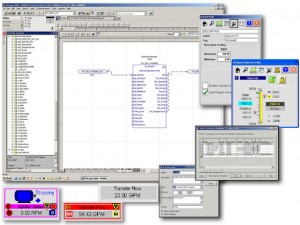A disclaimer: My entry into the world of automation was by way of the traditional PLC manufacturers, namely Rockwell Automation. My perspective is surely colored by this fact.
 In recent years, we’ve been hearing much from the Rockwell Folks about the PlantPAx system which is intended to put them in a position to compete directly with the big DCS manufacturers: DeltaV, Honeywell, Bailey, ABB for example. More recently I’ve learned of efforts by Schneider to do similarly by blending their PAC offerings with their Citect SCADA system. These efforts are interesting to me, since the DCS world appears largely as a closed ecosystem to independent integrators like Talos. This could change if the new “PAC” architectures begin to make inroads.
In recent years, we’ve been hearing much from the Rockwell Folks about the PlantPAx system which is intended to put them in a position to compete directly with the big DCS manufacturers: DeltaV, Honeywell, Bailey, ABB for example. More recently I’ve learned of efforts by Schneider to do similarly by blending their PAC offerings with their Citect SCADA system. These efforts are interesting to me, since the DCS world appears largely as a closed ecosystem to independent integrators like Talos. This could change if the new “PAC” architectures begin to make inroads.
All this has led me to ask the following questions of whoever I could find that might know:
- Why would people pay the price premium that a DCS system demands if the alternatives are “just as good”?
- Why is the DCS support model so closed? Why can’t independent integrators get involved, and why can’t end customers use independent integrators?
- What are the technical merits of one approach over the other: Are there things that a DCS can’t do that a PLC can? Vice-Versa?
Here’s what I’ve learned. Hopefully it can help you in your journey to select the appropriate architecture for your plant:
Cost
DCS systems are expensive: Generally a great deal more so than a similar PLC / SCADA architecture. There are a two underlying reasons:
The actual underlying cost of the hardware and labor is high: The DCS folks have to fly a long way. Redundancy is standard driving the cost up.
The quality implication of price: DCS customers typically want to know that they’re buying the best. DCS vendors signal that they’re the best by charging a premium.
Support & the Role of the Integrator
DCS systems are typically supported by factory personnel or dedicated support companies that only service one DCS platform. This is a double edged sword:
Because the people are dedicated to one platform of DCS system, they’re highly skilled in its application.
Because you have only one place to go, they can pretty much charge what they want (once you’re in). Opportunities to shop around are limited. The marketing lingo for this is “high switching cost.”
Technical Considerations
DCS systems have redundancy built in.
Because of this, you have hot replacement capabilities… If something breaks you put a new one in.
DCS systems typically have a centralized configuration system to keep everything in sync. With PLCs, this generally has to be done administratively.
With regard to running the process and showing the operators pretty screens, there’s very little difference and you’d have to have a very large complex process to be worried at all that either solution would be unable to do it. This reminds me of a separate conclusion I’ve reached with regard to PLC type automation hardware: There is very little that separates one vendor from another in terms of their ability to solve a given automation problem. They can all do it, so the decision ought to be based on factors such as support, price and ease of use.
DCS systems typically have to be augmented by PLCs to do high speed start / stop stuff. If you use PLCs for process control as well, you can do it all with the same platform (common spares, etc).
The Conclusion…
Only a thorough analysis of your process and production needs can lead you to the right conclusion about the appropriate automation architecture for your plant. The new DCS alternatives are capable of running many of the processes that have historically been the domain of the DCS vendors. That said, there are still many applications where a traditional DCS system is the best fit. Hopefully this will get you started on your pro’s & con’s list.
– Jason





